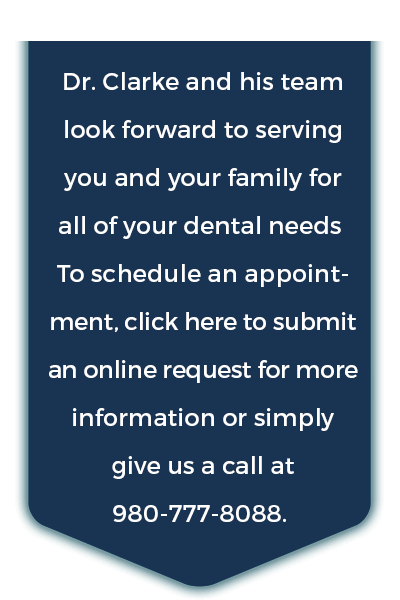
Preventive Care
Dental Exams
At the beginning of your visit to Rocky River Family Dentistry, we will provide you with a thorough examination to look for any potential problems. We may need to record a few X-rays to get a closer, more detailed look. If Dr. Clarke finds any signs of decay or other problems, he will recommend the most appropriate treatment options and make note of any conditions that he will need to monitor. Because maintaining good oral hygiene is very important, we will provide you with proper oral hygiene instructions and tips for taking good care of your teeth.
Routine Teeth Cleaning
Having your teeth professionally cleaned twice a year is a great way to safeguard your smile. During this type of routine office visit, your dental hygienist will remove plaque from your teeth where your brush cannot reach, like under the gum line and in the tight spaces between your teeth. We will then clean your teeth thoroughly and finish up by applying fluoride to help protect your teeth from decay.
General Dentistry
Root Canals
Dr. Clarke may recommend you have a root canal if you have a badly decayed tooth. This is a dental procedure that involves removing the decayed tissue from inside the tooth, reshaping the canal and then filling it with a special filler. Root canals are often recommended when there has been a dental injury, severe decay, or an infection or inflammation of the tooth pulp. If left untreated, these types of problems can do extensive damage to the structure of the tooth.
Tooth Extractions
The complete removal of a tooth is called an extraction. Dr. Clarke may recommend you have a tooth extracted if:
- A primary tooth is preventing a permanent tooth from erupting normally.
- The tooth has suffered extensive decay or trauma that cannot be repaired.
- You have severe gum disease.
- You have an impacted tooth like a third molar or “wisdom tooth”. Third molars often need to be extracted because they erupt long after the other teeth have grown in, leaving them little to no room to come in.
Depending upon the complexity of the case, an extraction can be done surgically or non-surgically. A mild anesthesia is used to ensure you are as comfortable as possible while your tooth is being extracted.
Full & Partial Dentures
Missing teeth cause a host of problems from jawbone deterioration, difficulty speaking and eating to low self-esteem. Dr. Clarke advises all his patients to never give up on a healthy smile. Advances in dental materials and technology have made complete and partial dentures more lifelike and natural looking, not to mention extremely comfortable.
A partial denture consists of multiple teeth on a metal frame and a gum colored plastic base to replace the missing teeth. A partial denture is normally secured with clips or brackets, but unlike a bridge, it is removable. A complete denture replaces all the teeth of the upper or lower jaw on a gum-colored plastic base.
Implant-Supported Dentures: Dental implants are small titanium posts anchored into the jawbone which may be used to secure a complete or partial denture in the mouth. There are many different variations of securing the missing teeth to the implants, but they all increase the security, stability, and function of the dentures. Dr. Clarke will recommend the most appropriate treatment for you.
Dental Implant Restoration
A dental implant is a small, screw-like post that is surgically placed into the jawbone, serving as an anchor for a dental crown. The titanium metal material that the implant is made from is designed to seamlessly integrate with the bone in your jaw, resulting in a stable, more natural feeling tooth replacement. Once the implant has fused properly with the bone, a crown is permanently attached to the implant that looks and feels like your natural tooth.
Pediatric Dentistry
There are a variety of dental treatments that Dr. Clarke and his team provide to prevent tooth decay or repair teeth when necessary.
Topical Fluoride — Fluoride incorporates into the enamel of teeth, making it harder and more resistant to decay. Although there is a small amount of fluoride in toothpastes and in some drinking water supplies, we can apply a higher concentration onto your child’s teeth for maximum protection.
Dental Sealants — Dental sealants are easy to apply and provide years of protection from cavities by sealing the little grooves on the chewing surfaces of back teeth known as “pits and fissures.”
Dental Bonding — Chips and minor fractures to front teeth — common childhood occurrences — can be repaired with tooth-colored bonding materials. These lifelike resins made of plastic and glass can be used on baby teeth as well as permanent teeth and last until your child has completed facial growth.
Baby Tooth Root Canal Treatment — Sometimes children need root canals to save an injured or severely decayed tooth. Saving baby teeth from premature loss can help prevent early tooth movement that would require extra orthodontic treatment.
Orthodontic Evaluation — By around age 7, most malocclusions have become evident and interceptive orthodontic treatment around this time can help direct proper tooth positioning and/or jaw growth, eliminating or simplifying the need for later treatment.

Cosmetic Dentistry
Before we begin with any cosmetic treatments, you’ll first undergo a thorough dental exam to make sure that your cosmetic issues aren’t a sign of an underlying dental disease or condition. When your dental health has been established, we’ll discuss what cosmetic dentistry treatments you’re interested in.
- Cosmetic Bonding – To repair teeth that have small chips or cracks in them.
- Crowns & Bridgework – For replacing large amounts of lost tooth structure or missing teeth.
- Dental Implants – For those who are looking for a more permanent tooth replacement option.
- Inlays & Onlays – To fill teeth that have large cavities.
- Invisalign Clear Aligners – For correcting orthodontic problems in a highly discreet manner.
- Porcelain Veneers – For masking any chips or cracks on the fronts of a patient’s teeth.
- Removable Dentures – To provide those with missing teeth with an affordable tooth replacement option.
- Teeth Whitening – To whiten a discolored smile.
- Tooth-Colored Fillings – For replacing cavities with a completely natural look.


Invisalign
We Are An Invisalign Provider
Consider Invisalign treatment to get the beautiful straight teeth you’ve always wanted — without braces. A complimentary consultation with our Dr. Clarke can determine if Invisalign clear aligners are right for you.
What Is It?
Invisalign treatment uses a series of virtually invisible, removable, and comfortable aligners that allow you to smile more during treatment as well as after. Invisalign clear aligners are made with advanced 3D computer imaging technology and has been proven effective in straightening your smile!
How Does It Work?
You wear each set of aligners for about two weeks, removing them only to eat, drink, brush, and floss. As you replace each aligner with the next in the series, your teeth will move little by little, week by week; until they have straightened to their final positions. You’ll visit us about once every six weeks to ensure that your treatment is progressing as planned. Total treatment time averages nine to 15 months and the average number of aligners worn during treatment is between 18 and 30, but both will vary from case to case.
To learn more, call us at 980-777-8088 or click here to schedule an appointment..




